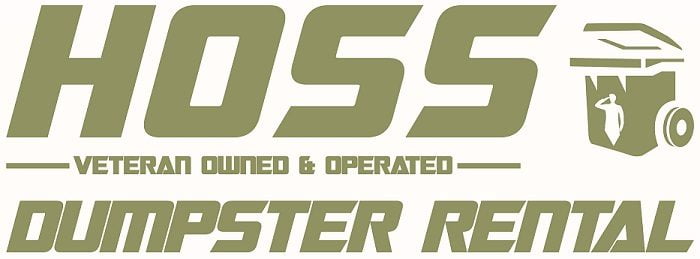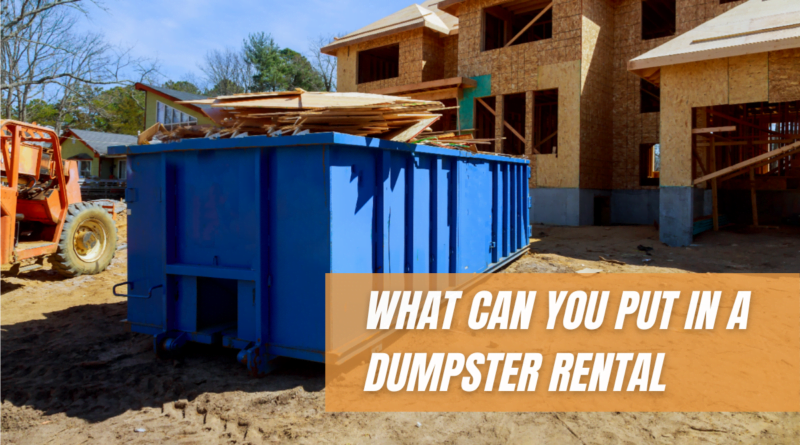WHAT CAN YOU PUT IN A DUMPSTER RENTAL
WHAT CAN YOU PUT IN A DUMPSTER RENTAL
When considering what items, both recyclable and non-recyclable, can be placed in a dumpster rental, the range is quite extensive, encompassing various household and construction materials. Nearly anything that doesn’t pose a threat to the dumpster, or the environment, is generally acceptable.
- Household Junk:
Household junk, including things like furniture, everyday items, and certain appliances, can confidently find a place in the dumpster. This category extends to outdoor junk such as shingles and siding, deemed safe for disposal.
- Wooden Furniture:
Wooden furniture, ranging from chairs and tables to bed frames and shelves, all made from untreated wood, is typically accepted. The disposal of household appliances, like microwaves, blenders, and toasters, is permissible, with larger appliances subject to specific rules.
- Yard Debris:
Yard debris, such as leaves, branches, and sticks, is generally considered safe for disposal. Organic and non-hazardous materials from your yard are also acceptable in the dumpster.
- Dirt Disposal:
Dirt disposal is generally permitted, excluding contaminated soil. Communities may offer recycling options for soil, providing an eco-friendly alternative.
- Electronics:
Electronics, including computers and electronic devices that are no longer recyclable, can be thrown into the dumpster, with the caveat that larger quantities may require alternative disposal methods.
- Battery Disposal:
Alkaline batteries, free from mercury due to recent manufacturing changes, are safe for disposal in landfills and dumpsters. Empty aerosol cans are accepted as long as they are empty, preventing the risk of explosions.
- Demolition Debris:
Demolition debris, encompassing materials like drywall, plywood, brick, concrete, stone, and tiles, is allowed in dumpsters. However, weight limitations should be considered, especially with heavier products.
WHAT CAN SOMETIMES BE PUT IN A DUMPSTER RENTAL
Navigating the world of dumpster rentals involves understanding what items are sometimes allowed, depending on your location and specific regulations by authorities. Here’s a detailed breakdown of materials that may find a place in a dumpster rental in certain areas:
- Upholstered Furniture:
In some regions, upholstered furniture like couches and recliners can be put in a dumpster, but it’s essential to note that this allowance varies. Always check with local disposal guidelines and consider alternative furniture disposal methods if a dumpster isn’t an option.
- Yard Debris:
Dumpsters often accommodate yard clutter, such as tree branches and shrubs. However, the specifics can differ – some areas may accept various debris, while others may limit it to a few bags of grass or leaves. Additional disposal fees, particularly per stump, might apply in certain locations.
- Appliances:
Most appliances can go in a dumpster, excluding refrigerators and water heaters due to safety concerns. Gas-free grills, lawnmowers, microwaves, stoves, vacuums, and dishwashers are generally accepted. However, be aware of potential extra fees based on local regulations.
- Electronics:
Certain areas allow the disposal of electronics in dumpsters, encompassing items like TVs, computers, treadmills, and personal electronics in small quantities. Some locations have mandated electronics recycling, leading to an extra charge per item. However, in some areas, dumpster services cannot accept any electronics, aligning with local regulations.
- Dirt:
In select service areas, dumpsters can be used for dirt disposal. However, contaminated soil with chemicals or unnatural materials is prohibited. Responsible dirt disposal alternatives must be explored in such cases, and polluted soil should be taken to approved soil treatment centers.
- Mattresses & Box Springs:
Dumpster acceptance of bed mattresses varies by service area. In cases where permitted, there might be fees for breaking them down before recycling or landfilling. If a dumpster isn’t an option, explore alternative mattress disposal methods.
- Tree Stumps & Large Yard Debris:
Some service areas permit tree stumps, but this is not universal. Additional fees per stump may apply in specific locations. Large branches and stumps might have diameter limitations. If not accepted, alternative yard debris disposal methods should be considered.
- Event Debris:
After events like backyard weddings or neighborhood festivals, small amounts of food may be allowed in dumpsters in certain areas. However, some locations prohibit food entirely, potentially resulting in extra fees. Always check ahead to avoid complications and explore local composting centers for proper organics disposal.
- Aerosol Cans:
Empty aerosol cans can typically be placed in a dumpster. It’s crucial to note that full or partially full cans pose a risk of explosion and should not be discarded in dumpsters. Adhering to safety guidelines ensures responsible disposal.
WHAT CAN NOT BE PUT IN A DUMPSTER RENTAL
Understanding what you cannot put in a dumpster rental is crucial to ensure the safety of the environment and the dumpsters themselves. Here’s a comprehensive look at items that should never be thrown into a dumpster:
- Refrigerators and Air Conditioners:
Fridges and air conditioners use harmful refrigerants. Before disposal, these appliances must have the refrigerant completely drained, usually requiring professional assistance.
- Tires:
Legally, tires cannot go to landfills due to the potential for methane gas accumulation. Instead, take tires to an automobile or tire store for proper recycling.
- Paint and Lacquers:
Wet paint and lacquers are unsafe for disposal. Empty paint cans with dry remnants are acceptable only after the product has dried. Latex paints can be poured into absorbent materials and disposed of once dry.
- Adhesives:
Adhesives are not allowed in dumpsters as they can cause leaks and create a sticky mess inside.
- Non-Alkaline Batteries:
Batteries using lithium or other materials besides alkaline are unsafe for dumpsters. These batteries can emit toxic fumes and chemicals in a compressed environment like a landfill.
- Hazardous Materials:
Items with hazard symbols should never be added to a dumpster. Check the product’s packaging for disposal instructions or explore recycling options.
- Medical Infectious Material:
Syringes and contaminated materials, including those with blood or other fluids, are not suitable for dumpster disposal. Proper medical disposal methods should be followed.
- Hot Water Tanks:
Due to the potential for explosions in landfills, hot water tanks are not allowed in dumpsters. The gases in their tanks pose safety concerns.
- Inks and Resins:
Inks and resins, like adhesives, can break and rupture, spilling contents and contaminating products.
- Oils and Fuels:
Dumpsters are not suitable for the disposal of oils and fuels. Investigate state or community options for safe disposal.
- Asbestos:
Construction debris is only acceptable if not contaminated by asbestos. Contaminated items will spread the problem, requiring professional removal of asbestos for safety.
- Household Cleaning Fluids:
Most cleaning products should not go in a dumpster. Refer to product packaging for safe disposal instructions, such as diluting and pouring down the drain for some detergents.
Contact Us Today
For those seeking to rent a roll-off dumpster in Pierce County, the process is seamlessly managed by the team at Hoss Dumpster Rental. Whether you require a single haul or multiple hauls, for short-term cleanups or long-term projects, connect with Hoss Dumpster Rental to facilitate your dumpster rental needs. Get a free quote today or call us at (253) 553-2978.

